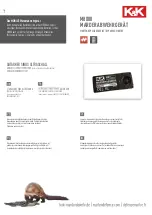
Siemens Industry, Inc.
54
8.2 Visual Inspection
Check:
•
External Source fuse (if External Source Terminals are
used to power the unit)
•
Fuse connectors not mated properly
•
Jumpers not in their correct positions
•
Terminal Strip connectors not mated properly
•
Terminal Strip connector jumpers missing or screws not
tightened properly
8.3 Troubleshooting Based on Alert
Messages
Alert messages can be used to help diagnose both system
problems (ones which include both regulator and
controller), and internal MJ-5 problems. Table 8.1 provides
suggestions for troubleshooting an MJ-5 Control Panel
using information from the <
ALERTS
> menu.
Note that faults identified as “temporary” may be due to
transient conditions within the system and may not be
internal MJ-5 faults.
8.4 Voltage and Current Calibration
The MJ-5 Metering functions are calibrated at the factory.
Periodically check calibration, and, if needed, recalibrate
the MJ-5:
8.4.1 Checking the U2 Voltage Calibration
Note:
You can check the U2 voltage calibration while the
panel is installed on a regulator.
To check U2 calibration, apply an AC voltage (in the range
of 115 to 135 VAC) from U2 to E. Monitor the Voltage
Calibration/Test Terminals with a true RMS voltmeter.
View the “U2 Cal” screen on the MJ-5 (i.e., go to <DIAG-
NOSTICS> menu and press down arrow once to show “U2
Cal”.) Verify that the “U2 Cal” reading matches the applied
voltage (within ± 0.5 VAC). If calibration is off, recalibrate
(see below).
8.4.2 Checking the P2 Voltage Calibration
Note:
If the regulator provides the “source” voltage signal,
you can check the P2 voltage calibration while the panel is
installed on the regulator. (If the regulator lacks a “source”
voltage signal, then there is no need to calibrate the P2
input.)
To check P2 calibration, apply an AC voltage (in the range
of 115 to 135 VAC) from P2 to E. Monitor the Voltage
Calibration/Test Terminals with a true RMS voltmeter.
View the “P2 Cal” screen on the MJ-5 (i.e., go to <DIAG-
NOSTICS> menu and press down arrow twice to show “P2
Cal”) Verify that the “P2 Cal” reading matches the applied
voltage (within ± 0.5 VAC). If calibration is off, recalibrate
(see below).
8.4.3 Checking the Load Current Calibration
Note:
To check the current calibration, remove the panel
from the tap changer apparatus, connect an external
ammeter, and apply an external AC current source.
To check C/C2 calibration, apply a current (in the range of
5 to 140 mA) at C2/E1 and verify that C/C2 reads within
±0.5 mA of the applied value (as displayed on external
Ammeter connected at C/C2).
8.4.4 Calibrating the U2 Voltage
Connect an external true RMS voltmeter at the front panel
“Voltage Calibration/Test Terminal.” Apply the nominal
calibration
voltage (per Table 8.2.) Display the “U2 Cal”
screen. To calibrate, press the Change/Save key, then the
▼ or ▲ key to make the value shown on the MJ-5 display
agree with the external voltmeter value. When the correct
value is displayed, press the Change/Save key to complete
the process.
Note:
If password protection is in effect, you must enter
the password to enable calibration. The default password
for the
<DIAGNOSTICS>
menu is “3333”.
8.4.5 Calibrating the P2 Voltage
Connect an external true RMS voltmeter at the front panel
“Voltage Calibration/Test Terminal.” Apply the nominal
calibration voltage (per Table 8.2.) Display the “P2 Cal”
screen. To calibrate, press the Change/Save key, then the
▼ or ▲ key to make the value shown on the MJ-5 display
agree with the external voltmeter value. When the correct
value is displayed, press the Change/Save key to complete
the process
120 volts on terminal block, leads, and
inside control panel housing.
May result in minor or moderate injury
including equipment damage.
Disconnect all power sources before
making connections to the terminal block
or opening the control panel housing.
















































